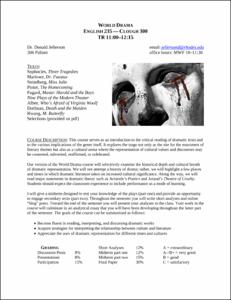Please use this identifier to cite or link to this item:
http://hdl.handle.net/10267/15341Full metadata record
| DC Field | Value | Language |
|---|---|---|
| dc.contributor.author | Jellerson, Donald | - |
| dc.date.accessioned | 2013-02-05T16:37:54Z | - |
| dc.date.available | 2013-02-05T16:37:54Z | - |
| dc.date.issued | 2011-01-12 | - |
| dc.identifier.uri | http://hdl.handle.net/10267/15341 | - |
| dc.description | This syllabus was submitted to the Office of Academic Affairs by the course instructor. Uploaded by Archives RSA Josephine Hill. | en_US |
| dc.description.abstract | This course serves as an introduction to the critical reading of dramatic texts and to the various implications of the genre itself. It explores the stage not only as the site for the enactment of literary themes but also as a cultural arena where the representation of cultural values and discourses may be contested, subverted, reaffirmed, or celebrated. Our version of the World Drama course will selectively examine the historical depth and cultural breath of dramatic representation. We will not attempt a history of drama; rather, we will highlight a few places and times in which dramatic literature takes on increased cultural significance. Along the way, we will read major statements in dramatic theory such as Aristotle’s Poetics and Artaud’s Theatre of Cruelty. Students should expect the classroom experience to include performance as a mode of learning. I will give a midterm designed to test your knowledge of the plays (part one) and provide an opportunity to engage secondary texts (part two). Throughout the semester you will write short analyses and online “blog” posts. Toward the end of the semester you will present your analyses to the class. Your work in the course will culminate in an analytical essay that you will have been developing throughout the latter part of the semester. The goals of the course can be summarized as follows: • Become fluent in reading, interpreting, and discussing dramatic works • Acquire strategies for interpreting the relationship between culture and literature • Appreciate the uses of dramatic representation for different times and cultures | en_US |
| dc.language.iso | en_US | en_US |
| dc.publisher | Memphis, Tenn. : Rhodes College | en_US |
| dc.relation.ispartofseries | Syllabi CRN;21182 | - |
| dc.rights | Rhodes College owns the rights to the archival digital images in this collection. Objects are made available for educational use only and may not be used for any non-educational or commercial purpose. Approved educational uses include private research and scholarship, teaching, and student projects. Original copies of the programs are stored in the Rhodes College Archives. In all instances of use, acknowledgement must be given to Rhodes College Archives Digital Repository, Memphis, TN. For information regarding permission to use this image, please email the Archives at archives@rhodes.edu | - |
| dc.subject | English, Department of | en_US |
| dc.subject | Syllabus | en_US |
| dc.subject | Academic departments | en_US |
| dc.subject | Curriculum | en_US |
| dc.subject | Text | en_US |
| dc.subject | 2014 Spring | en_US |
| dc.title | ENGL 235-01, World Drama, Spring 2011 | en_US |
| dc.type | Syllabus | en_US |
| Appears in Collections: | Course Syllabi | |
Files in This Item:
| File | Description | Size | Format | |
|---|---|---|---|---|
| 2011_SPRING_ENGL_235_01_21182.pdf | 253.7 kB | Adobe PDF |  View/Open |
Items in DSpace are protected by copyright, with all rights reserved, unless otherwise indicated.